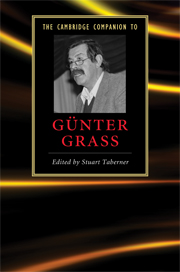Book contents
- Frontmatter
- Introduction
- 1 Biography as politics
- 2 Günter Grass’s political rhetoric
- 3 The exploratory fictions of Günter Grass
- 4 Günter Grass and magical realism
- 5 Günter Grass’s ‘Danzig Quintet’
- 6 Günter Grass and gender
- 7 Authorial construction in From the Diary of a Snail and The Meeting at Telgte
- 8 Günter Grass’s apocalyptic visions
- 9 Günter Grass and German unification
- 10 Günter Grass’s Peeling the Onion
- 11 Günter Grass as poet
- 12 Günter Grass and art
- 13 Günter Grass as dramatist
- 14 Film adaptations of Günter Grass’s prose work
- 15 Günter Grass and his contemporaries in East and West
- Guide to further reading
- Index
13 - Günter Grass as dramatist
Published online by Cambridge University Press: 28 January 2010
- Frontmatter
- Introduction
- 1 Biography as politics
- 2 Günter Grass’s political rhetoric
- 3 The exploratory fictions of Günter Grass
- 4 Günter Grass and magical realism
- 5 Günter Grass’s ‘Danzig Quintet’
- 6 Günter Grass and gender
- 7 Authorial construction in From the Diary of a Snail and The Meeting at Telgte
- 8 Günter Grass’s apocalyptic visions
- 9 Günter Grass and German unification
- 10 Günter Grass’s Peeling the Onion
- 11 Günter Grass as poet
- 12 Günter Grass and art
- 13 Günter Grass as dramatist
- 14 Film adaptations of Günter Grass’s prose work
- 15 Günter Grass and his contemporaries in East and West
- Guide to further reading
- Index
Summary
When Günter Grass was awarded the prestigious Büchner prize in 1965 it was for both his prose and his poetry. He had written five of his seven full-length plays by then, and all four of his one-acters, yet they were not recognised by the awards committee. The plays have not proved especially popular in theatres; however, they may have become more stageable in the light of contemporary directing practices. This chapter will consider the problems Grass sets the theatre in his dramatic work by identifying recurring patterns in the form of the plays. I shall examine selected texts in order to suggest new readings that challenge a more conventional pigeon-holing of Grass's drama and assess Grass's stature as a playwright. It is fair to say that Grass wrote his plays in two phases, the first from 1954 to 1958; and the second from 1963 to 1968. The first has generally been termed 'absurd' or 'poetic'; the second 'political'. The watershed between the two was the writing of The Tin Drum (1959). However, as with so many borders nowadays, breaches may be detected: there is a surprising constancy in certain of Grass's dramaturgical practices which defy the easy model of two phases, and these can be identified in the playwright's first foray into the dramatic genre, the short sketch Rocking Back and Forth (1954). While Grass has never discussed the aesthetics of his plays in any great depth, he does present a series of dramaturgical features that was to inform the rest of the work, however unconsciously, in the form of this short play. Rocking is subtitled 'A Prologue in the Theatre', the same term Goethe uses for metatheatrical reflection at the beginning of his Faust I, yet in Grass's case, the prologue actually covers almost all his dramatic output.
- Type
- Chapter
- Information
- The Cambridge Companion to Günter Grass , pp. 180 - 192Publisher: Cambridge University PressPrint publication year: 2009

